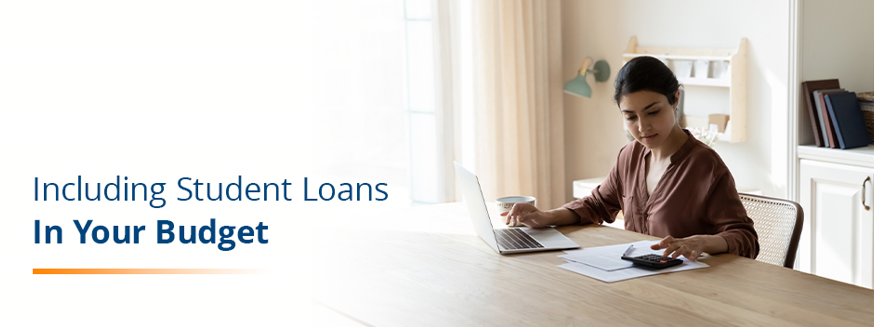Including Student Loans In Your Budget

If you need help budgeting for your student loans, you are not alone. There are 43 million people across the U.S. with student loan debt with an average amount owed of over $40,000.
No matter how much you owe, creating a detailed budget that includes your student loan repayments can help you pay off your debt quicker. Budgeting enables you to visualize how you use your money and how you can reallocate it to make your student loan payments.
How to Add Student Loan Payments to Your Budget

Creating a detailed budget may feel overwhelming. Factoring in expenses such as housing, transportation, and income can be challenging; especially if you are a recent graduate. The following steps will help you begin putting together your budget to repay student loans and can be updated over time as your needs or lifestyle change.
- Add up your income: The first step is to calculate how much you earn. You may receive payment from a salaried job, freelance work, or a home-based business. Add up your after-tax income to get the base of your budget.
- Calculate your expenses: When listing your expenses, start with the essentials — excluding your student loans for now. Things you can’t go without include rent or mortgage payments, food, utilities, and transportation.
- Know your total student loan debt: Assess your student loans and the amount you owe. Most student loan providers have online dashboards you can access to view your total loan amounts, interest rates, and estimated monthly repayment amount.
- Know your loan type and repayment plan options: Depending on the type of student loans you have, federal or private, you may be able to take advantage of different types of repayment plans. For federal student loans, there are various types of repayment plans. The three primary options include the following.
- A standard repayment plan extends equal interest and principal payments over 10 years. This option is the most cost-effective if your budget allows.
- A graduated repayment plan begins with a lower monthly payment that increases every two years.
- An income-driven plan uses your income as a payment basis, so it will fluctuate as you earn more or less money.
There are limited repayment plan options for private student loans. In most cases, you’ll pay principal and interest amounts over five, 10, 15, or 20 years without the possibility of an income-driven repayment. They may also carry higher interest rates than federal loans, so prioritizing repayment with other high-interest debt is wise.
Establish financial goals
After creating a budget, you can see how much money you have left. It’s best to consider your financial objectives and how you want to allocate the extra money you have available. You may choose to pay off more of your student loan obligations or you may have another goal, like an emergency fund you are saving toward. Consider your priorities before allocating your money.
Additional Tips for Paying off Your Student Loan
While having a budget is a crucial first step to paying off your student loan debt, it’s not the only thing you can do.
- Track your current spending: It’s easy to overspend if you don’t keep track of your spending. Track every one of your expenses, even when you pay in cash. It will help you to see where your money is going and where you need to cut back. You can use several solutions such as inputting your receipts and expenses into a spreadsheet, a budgeting app, or another online platform.
- Automate your payments: Setting up automatic loan payments will ensure they get made on time. It will also help you avoid fees for late payments. Some private and federal loan providers may even discount your interest rates for paying automatically.
- Be flexible and patient: Your budget may need to change over time, so be flexible and adapt as your income and expenses increase or decrease. If you are able to allocate more money to paying your student loans each month, you can repay your loan faster, reducing your total cost and interest. Repaying your student loan will take time, but you can reach your goal with a consistent plan.
Trust Mid Penn Bank with Your Finances
If you have done everything you can to budget, but you’re still struggling to keep up with payments, don’t hesitate to seek help. You can talk to a loan servicer or a financial adviser who can help you create a financial strategy to achieve your goals. At Mid Penn Bank, we take a personalized approach to providing you with service and advice. We want to give you peace of mind that you are in good hands.
We have a range of resources to help you stay on top of your spending and meet your financial goals. We treat each of our clients as an individual and offer comprehensive personal banking services that we tailor to their financial needs. To learn more about our services, contact us online or make an appointment at a financial center near you today!

Share:
Disclosures
The material on this site was created for educational purposes. It is not intended to be and should not be treated as legal, tax, investment, accounting, or other professional advice.
Securities and Insurance Products:
NOT A DEPOSIT | NOT FDIC INSURED | NOT BANK GUARANTEED | NOT INSURED BY ANY FEDERAL GOVERNMENT AGENCY | MAY LOSE VALUE
